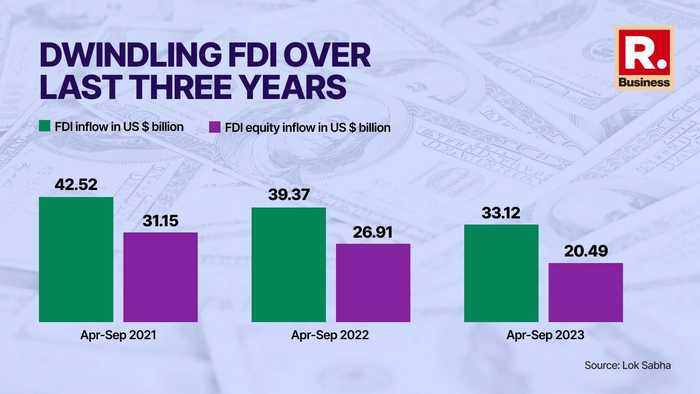Published 13:57 IST, December 22nd 2023
Here’s why 2023 has been a year of quantum FDI decline
The decline in FDI was felt mostly in developed economies, where FDI fell by 37 per cent to $378 billion.
- Economy News
- 5 min read
“I don’t want 2023 to be repeated again,” sums up Hossam Heiba, President, General Authority for Investment and Free Zone, Egypt, while being perched on a swanky couch placed in the corner of the lounge at 27th World Investment Conference in Delhi. Heiba, while speaking to Republic Business, counts 2023 as one of the unprecedented years when FDI and investments across the world were squeezed, and decline was quite significant. However, UNCTAD's annual investment report while shedding light on the quantum of FDI decline showed that in 2022, the overall global FDI declined by 12 per cent to $1.3 trillion in 2022 after a strong rebound in 2021 following the steep drop induced by the coronavirus pandemic in 2020.
“2023 was an unusual year as Global FDI levels fell significantly and has declined dramatically but at the same time there has been an emergence of mega projects primarily in North America but increasingly Europe and Asia are kind of dominating attention and it's a bit of a paradox,” Andreas Dressler, Managing Director at FDI Center told Republic Business. He also added that if you look at overall statistics and some of the announcements then you will get the impression that investment is thriving and is buoyant.
The decline in FDI was felt mostly in developed economies, where FDI fell by 37 per cent to $378 billion. But flows to developing countries grew by 4 per cent even though the FDI grew unevenly across developing countries. However, the greenfield investment project announcements were up 15 per cent in 2022, growing in most regions and sectors. According to the Organisation of Economic Cooperation Development, the global FDI flows rebounded to $727 billion in the first half of 2023 but remained 30 per cent below the levels recorded in the first half of 2022.
Much of the increase came in the first quarter of 2023, whereas global FDI flows dropped by 44 per cent in Q2 2023, compared to the previous quarter. FDI flows into non-OECD G20 economies dropped by 15 per cent in the first half of 2023. They decreased by 13 per cent in Q1 and by a further 27 per cent in Q2. The United States was the leading FDI recipient worldwide, followed by Brazil; Canada and Mexico, both equally ranked as third largest FDI recipients. The United States was also the major investor worldwide, followed by China and Japan.

Dressler sees rising protectionism and more inward-looking policies introduced by various countries as major dampener for FDI across the world. On August 9 this year, US President Joe Biden issued an executive order to regulate certain types of US outbound investment in semiconductors and microelectronics, quantum information technologies and artificial intelligence sectors in 'countries of concern', where this investment may be a threat to US national security. Investment in these technologies or subsets of them will be subject to notification rules.
While the US leads the G7 countries on this topic and the EU ponders a similar initiative, China, Japan, South Korea and Taiwan already have comparable rules in place. Ajay Sahai, Director, and CEO of Federation of Indian Export Organisation also believes that protectionism across the world is on rise posing a big challenge for investment mobilisation and FDI. “If you look into the recent report, it shows that the total protectionism measures which were in play were about close to 9,000 a decade before and have risen to around 35,000 now.
So, every country is looking inwardly because they feel that they want to have the best of the production facilities in their own country, but I think this is something which will be short-lived,” Sahai told Republic Business. Similarly, the carbon adjustment mechanism of the EU rolled out in October 2023 also sent shockwaves across the investors’ community across the globe. CBAM is the EU's landmark tool to fight carbon leakage and will equalise the price of carbon between domestic products and imports. Dressler also considered this as a major dampener for FDI and trade across the world.
“It's been an interesting year, the global FDI declined by 7-12 per cent but for Africa it fell by 42 per cent which is quite significant. The impact of the pandemic is that countries are now looking inwards and that is a big problem for FDI’s across the world. Investment should not be influenced by geopolitical tension, it has to be a rational business decision,” Grant added. “That is how the world is going to recover,” he quips.
“The economic challenges like increased interest rates globally is one formidable challenge. Secondly, geopolitical tensions all around also affect investors sentiment. The recent disturbance in the Middle east is affecting sentiments rather than affecting economically. All of these affect the investors' sentiment, due to this people kind of hold their investment decision,” Heiba from Egypt told Republic Business. Heiba further added that now the flow of money is changing, “When you have a series of events happening since the beginning of the year that does not go down well with smooth FDI take off,” he said.
Reminiscing 2023, Heiba with a sullen look says, “It was a tough year, with exception of 4-5 countries like India, Egypt, UAE.”
Updated 14:03 IST, December 22nd 2023